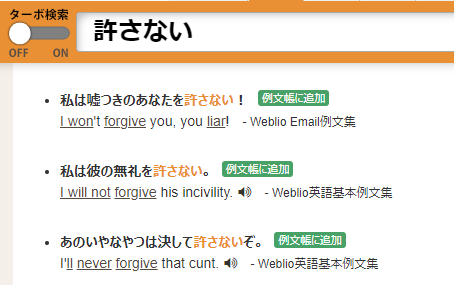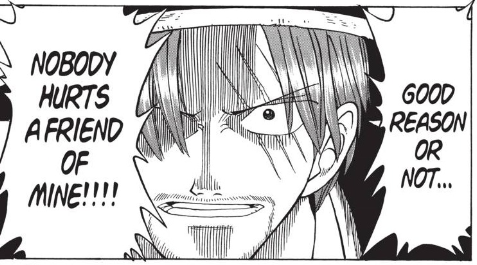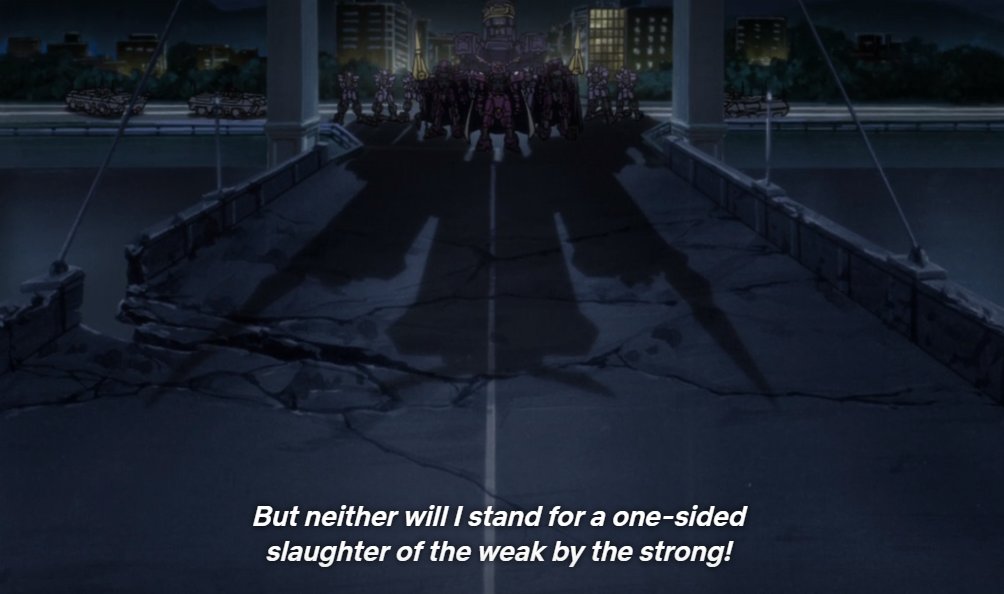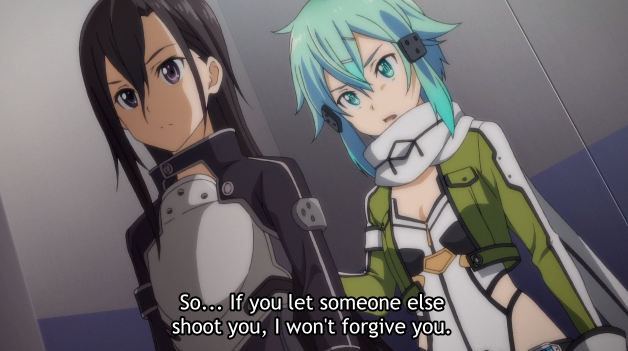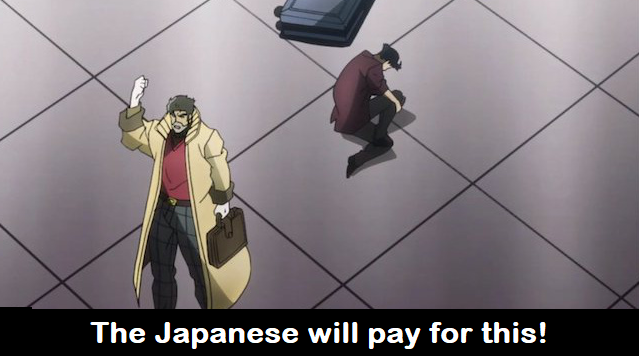Okay. Okay. Let& #39;s talk about translating 「許さない」.
Why do JA>EN translators get it so wrong all the time, and how can we avoid the same shortcomings, lest we, too, never be forgiven?
Why do JA>EN translators get it so wrong all the time, and how can we avoid the same shortcomings, lest we, too, never be forgiven?
(For non-Japanese speakers, this thread will ruin your enjoyment of subtitled or localized entertainment, because you WILL start seeing this phrase in literally EVERYTHING. You& #39;ve been warned.)
Why is this such a big pet peeve? It doesn& #39;t come up that often right?
WRONG. The phrase 「許さない!」 is a common tropey phrase in Japanese fiction, in the same way that "Over my dead body!" is a tropey phrase in English fiction.
Here are some examples from popular series:
WRONG. The phrase 「許さない!」 is a common tropey phrase in Japanese fiction, in the same way that "Over my dead body!" is a tropey phrase in English fiction.
Here are some examples from popular series:
1. どんな理由があろうと!!おれは友達を傷つける奴は許さない!!! (One Piece, Volume 1)
[ No matter what reason, I will not 許す anyone who hurts my friends!]
Captain Shanks is standing up to Higuma the Bear, who& #39;s just beat the crap out of a young Monkey D. Luffy.
[ No matter what reason, I will not 許す anyone who hurts my friends!]
Captain Shanks is standing up to Higuma the Bear, who& #39;s just beat the crap out of a young Monkey D. Luffy.
2. しかし、強い者が弱い者を一方的に殺すことは、断じて許さない! (Code Geass Episode 8)
[However, strong people one-sidedly killing weak people, that is not 許す!]
Lelouch is announcing his terrorist group& #39;s creed to a subjugated Japan via illegal broadcast.
[However, strong people one-sidedly killing weak people, that is not 許す!]
Lelouch is announcing his terrorist group& #39;s creed to a subjugated Japan via illegal broadcast.
私以外の奴に撃たれたら、許さないからね (Sword Art Online II, Episode 8)
[If you are shot by someone who is not me, that is not 許す, okay?]
Shino telling Kirito he shouldn& #39;t die on the battlefield--that only she should have the honor of shooting him. It& #39;s even a little flirty.
[If you are shot by someone who is not me, that is not 許す, okay?]
Shino telling Kirito he shouldn& #39;t die on the battlefield--that only she should have the honor of shooting him. It& #39;s even a little flirty.
Before we take a deeper look at how these examples were translated, let& #39;s talk about WHAT these words mean in Japanese and English and WHY it gets mistranslated all the damn time.
As we& #39;re all well aware, translation is about expressing equivalent meaning: that is, communicating what someone MEANS, not the exact words they say.
I have threads on this concept, but tl;dr: when a skateboarder "eats shit", he is not putting poop in his mouth.
I have threads on this concept, but tl;dr: when a skateboarder "eats shit", he is not putting poop in his mouth.
With equivalence in mind, let us stare in horror at this bane of JA>EN translation:
許さない!
I won& #39;t forgive you!
(sigh)
Long story short, the English translation does not express the same meaning as the Japanese. Let& #39;s talk about WHY.
許さない!
I won& #39;t forgive you!
(sigh)
Long story short, the English translation does not express the same meaning as the Japanese. Let& #39;s talk about WHY.
First, let& #39;s talk about how 許す is used in Japanese. What meanings can be expressed by a well-placed 許さない?
(Examples Taken from weblio& #39;s ejje corpus. https://ejje.weblio.jp/sentence/content/%E8%A8%B1%E3%81%95%E3%81%AA%E3%81%84/)">https://ejje.weblio.jp/sentence/...
(Examples Taken from weblio& #39;s ejje corpus. https://ejje.weblio.jp/sentence/content/%E8%A8%B1%E3%81%95%E3%81%AA%E3%81%84/)">https://ejje.weblio.jp/sentence/...
許す can mean 「allow」: to give someone permission
20歳まで飲酒は許されていない。
You& #39;re not allowed to drink until you are 20.
この危機の再発は許されない。
This must not be allowed to happen again.|
部外者はめったに入場を許されない.
Outsiders are rarely allowed in.
20歳まで飲酒は許されていない。
You& #39;re not allowed to drink until you are 20.
この危機の再発は許されない。
This must not be allowed to happen again.|
部外者はめったに入場を許されない.
Outsiders are rarely allowed in.
許す can mean「tolerate」: to accept or endure, to allow the existence or practice of.
失敗は許されない
Failure will not be tolerated.
そんないい加減なことはわしの職人気質が許さない。
My artisan pride cannot tolerate such sloppiness.
失敗は許されない
Failure will not be tolerated.
そんないい加減なことはわしの職人気質が許さない。
My artisan pride cannot tolerate such sloppiness.
In English, we can express this meaning with a variety of other words:
動物は虐待は許されない
Nothing can justify animal cruelty.
ばかなことは許さない
Take no bullshit. A no-nonsense attitude.
反駁を許さない立論
An irrefutable argument.
動物は虐待は許されない
Nothing can justify animal cruelty.
ばかなことは許さない
Take no bullshit. A no-nonsense attitude.
反駁を許さない立論
An irrefutable argument.
そんなことをしては良心が許さない
It would go against my conscience to do such a thing.
このあたりは極めて峻険で一歩も誤ることは許されない
The terrain is so steep that you cannot afford a single false step.
It would go against my conscience to do such a thing.
このあたりは極めて峻険で一歩も誤ることは許されない
The terrain is so steep that you cannot afford a single false step.
Finally, yes, 許す can mean 「forgive」: to stop feeling angry or resentful towards someone for an offense.
元カレを許した。
I forgave my ex-boyfriend.
謝ったから許す。
You apologized, so I forgive you.
元カレを許した。
I forgave my ex-boyfriend.
謝ったから許す。
You apologized, so I forgive you.
It& #39;s clear that 許す (and 許さない) has a variety of uses in Japanese.
Now, let& #39;s take a look at how we use the word "forgive" in English.
Now, let& #39;s take a look at how we use the word "forgive" in English.
Forgive: to stop feeling angry or resentful towards someone for an offense.
Let& #39;s forgive and forget.
さらりと水に流そう。
Forgive me for being late.
遅れてすみません.
Heaven forgive them.
神のお許しを
Let& #39;s forgive and forget.
さらりと水に流そう。
Forgive me for being late.
遅れてすみません.
Heaven forgive them.
神のお許しを
Forgive: to cancel (a debt).
Will you forgive me the [my] debt?
私の借金を免除してくれませんか?
Debt forgiveness.
債権放棄
Will you forgive me the [my] debt?
私の借金を免除してくれませんか?
Debt forgiveness.
債権放棄
Forgive: a request to excuse or regard indulgently one& #39;s ignorance or impoliteness.
Please do forgive me.
平にご容赦願います.
Please forgive me, just this once.
今度だけ勘弁して下さい.
Please do forgive me.
平にご容赦願います.
Please forgive me, just this once.
今度だけ勘弁して下さい.
You& #39;ll notice that many different words were used in Japanese -- because 許す =/= forgive in every single instance.
To correctly translate 許す (and really, any word), you must be aware of the meaning the speaker is trying to express with the word.
To correctly translate 許す (and really, any word), you must be aware of the meaning the speaker is trying to express with the word.
So how is it that translators, editors, and dubbing teams alike all get this word so wrong?
Like most things pertaining to translation, the answer is never simple, but here are my thoughts:
Like most things pertaining to translation, the answer is never simple, but here are my thoughts:
1. Translators/editors in a rush leaving it as-is because of constraints or deadlines
It happens to the best of us. You have a tight deadline, your boss is coming down on you, you really need to finish this script. You& #39;ll touch it up later... and then you don& #39;t.
It happens to the best of us. You have a tight deadline, your boss is coming down on you, you really need to finish this script. You& #39;ll touch it up later... and then you don& #39;t.
2. Non-native speakers unaware of native nuance.
On average, a translation done by a professional TLing into native tongue (L1) will be of better quality than one by a professional TLing into their L2. Yes, there are outliers, but this is standard. https://www.trainingfortranslators.com/2018/10/02/guest-post-the-importance-of-translating-into-your-native-language/">https://www.trainingfortranslators.com/2018/10/0...
On average, a translation done by a professional TLing into native tongue (L1) will be of better quality than one by a professional TLing into their L2. Yes, there are outliers, but this is standard. https://www.trainingfortranslators.com/2018/10/02/guest-post-the-importance-of-translating-into-your-native-language/">https://www.trainingfortranslators.com/2018/10/0...
This goes especially for works highly dependent on adaptation and localization, such as books, films, marketing materials, and user-facing applications. It& #39;s extremely difficult to study and learn all the nuances of culture-dependent language.
https://www.translationdirectory.com/articles/article1508.php">https://www.translationdirectory.com/articles/...
https://www.translationdirectory.com/articles/article1508.php">https://www.translationdirectory.com/articles/...
It doesn& #39;t help that many Japanese native-oriented resources are chock full of poor translations. Here are some from Weblio:
Then, there& #39;s the biggest elephant in the room: a history of poor-quality translation in the JA>EN localization industry.
Whether they be old 90s JRPGs pumped out with little thought put into their loc, or fansubs XDCC& #39;d in the late 2000s, poor translation was rampant...
Whether they be old 90s JRPGs pumped out with little thought put into their loc, or fansubs XDCC& #39;d in the late 2000s, poor translation was rampant...
...and most of us who are in the industry now grew up with it.
When you& #39;re used to seeing a certain phrase translated a certain way, you forget how strange it sounds to a native speaker& #39;s ear.
And thus, the unforgivable translation persists.
When you& #39;re used to seeing a certain phrase translated a certain way, you forget how strange it sounds to a native speaker& #39;s ear.
And thus, the unforgivable translation persists.
These are all thoughts and theories, of course; I& #39;d love to hear what your thoughts are.
With that being said, let& #39;s see how the official translations of our examples hold up!
With that being said, let& #39;s see how the official translations of our examples hold up!
1. どんな理由があろうと!!おれは友達を傷つける奴は許さない!!! (One Piece, Volume 1)
Good reason or not... NOBODY hurts a friend of mine!!!!
Good reason or not... NOBODY hurts a friend of mine!!!!
This is a fantastic translation that clearly conveys the intent of the original: that hurting his friends is unacceptable, and he& #39;s not gonna let the bastard getaway with it. 10/10.
(No, I& #39;m still not going to read all of One Piece. Sorry.)
(No, I& #39;m still not going to read all of One Piece. Sorry.)
2. しかし、強い者が弱い者を一方的に殺すことは、断じて許さない! (Code Geass Episode 8)
But neither will I stand for a one-sided slaughter of the weak by the strong!
But neither will I stand for a one-sided slaughter of the weak by the strong!
Another great translation!
Notice the use of "I will not stand" for 許さない. It clearly communicates the intent (their group won& #39;t sit idly by) but also makes Zero& #39;s bold, grandiose speech really shine.
Notice the use of "I will not stand" for 許さない. It clearly communicates the intent (their group won& #39;t sit idly by) but also makes Zero& #39;s bold, grandiose speech really shine.
3. 私以外の奴に撃たれたら、許さないからね (Sword Art Online II, Episode 8)
So... If you let someone else shoot you, I won& #39;t forgive you.
OH FOR FUCK& #39;S SAKE, SWORD ART.
So... If you let someone else shoot you, I won& #39;t forgive you.
OH FOR FUCK& #39;S SAKE, SWORD ART.
Let& #39;s rework Sinon& #39;s line, shall we?
But you better not let someone else shoot before I get to.
If you get shot out there, I& #39;ll shoot you myself. Got it?
Don& #39;t get shot out there. Your body& #39;s reserved for my bullets.
(Whipped these up on the fly: what you guys got?)
But you better not let someone else shoot before I get to.
If you get shot out there, I& #39;ll shoot you myself. Got it?
Don& #39;t get shot out there. Your body& #39;s reserved for my bullets.
(Whipped these up on the fly: what you guys got?)
The dub handles this fantastically:
You owe me a fight, so you BETTER stay alive.
 https://abs.twimg.com/emoji/v2/... draggable="false" alt="👌" title="OK-Hand" aria-label="Emoji: OK-Hand">
https://abs.twimg.com/emoji/v2/... draggable="false" alt="👌" title="OK-Hand" aria-label="Emoji: OK-Hand"> https://abs.twimg.com/emoji/v2/... draggable="false" alt="👌" title="OK-Hand" aria-label="Emoji: OK-Hand">
https://abs.twimg.com/emoji/v2/... draggable="false" alt="👌" title="OK-Hand" aria-label="Emoji: OK-Hand"> https://abs.twimg.com/emoji/v2/... draggable="false" alt="👌" title="OK-Hand" aria-label="Emoji: OK-Hand"> great dub writing, 10/10.
https://abs.twimg.com/emoji/v2/... draggable="false" alt="👌" title="OK-Hand" aria-label="Emoji: OK-Hand"> great dub writing, 10/10.
You owe me a fight, so you BETTER stay alive.
In the end, I& #39;ll sigh about "It can& #39;t be helped", and groan about "That& #39;s...", but there are plenty of instances where those translations still actually work and sound native, too.
But this one only ever ruins its dramatic moment.
And really, that& #39;s unforgivable.
But this one only ever ruins its dramatic moment.
And really, that& #39;s unforgivable.
ASIDE: Over my dead body!
Here are some ways that this tropey English phrase have been translated into Japanese!
And no, none of them are 俺の死体の上だぜ!!
絶対にダメだ。
おれの目の黒いうちはだめだ
絶対にそうはさせない。
死んでもさせない。
Here are some ways that this tropey English phrase have been translated into Japanese!
And no, none of them are 俺の死体の上だぜ!!
絶対にダメだ。
おれの目の黒いうちはだめだ
絶対にそうはさせない。
死んでもさせない。

 Read on Twitter
Read on Twitter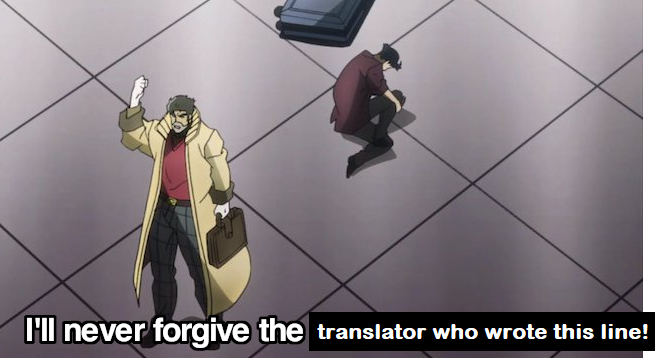
![1. どんな理由があろうと!!おれは友達を傷つける奴は許さない!!! (One Piece, Volume 1)[ No matter what reason, I will not 許す anyone who hurts my friends!]Captain Shanks is standing up to Higuma the Bear, who& #39;s just beat the crap out of a young Monkey D. Luffy. 1. どんな理由があろうと!!おれは友達を傷つける奴は許さない!!! (One Piece, Volume 1)[ No matter what reason, I will not 許す anyone who hurts my friends!]Captain Shanks is standing up to Higuma the Bear, who& #39;s just beat the crap out of a young Monkey D. Luffy.](https://pbs.twimg.com/media/EvrMvw0VoAQ_csZ.png)
![2. しかし、強い者が弱い者を一方的に殺すことは、断じて許さない! (Code Geass Episode 8)[However, strong people one-sidedly killing weak people, that is not 許す!]Lelouch is announcing his terrorist group& #39;s creed to a subjugated Japan via illegal broadcast. 2. しかし、強い者が弱い者を一方的に殺すことは、断じて許さない! (Code Geass Episode 8)[However, strong people one-sidedly killing weak people, that is not 許す!]Lelouch is announcing his terrorist group& #39;s creed to a subjugated Japan via illegal broadcast.](https://pbs.twimg.com/media/EvrMzYQVcAQG7Be.png)
![私以外の奴に撃たれたら、許さないからね (Sword Art Online II, Episode 8)[If you are shot by someone who is not me, that is not 許す, okay?]Shino telling Kirito he shouldn& #39;t die on the battlefield--that only she should have the honor of shooting him. It& #39;s even a little flirty. 私以外の奴に撃たれたら、許さないからね (Sword Art Online II, Episode 8)[If you are shot by someone who is not me, that is not 許す, okay?]Shino telling Kirito he shouldn& #39;t die on the battlefield--that only she should have the honor of shooting him. It& #39;s even a little flirty.](https://pbs.twimg.com/media/EvrM49cVcAEVssv.png)
